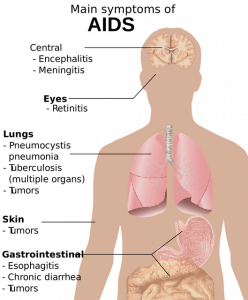
Six randomized controlled studies show that providing daily selenium supplementation to HIV-infected adults increases CD4 cell counts, reduces the risk of diarrhea morbidity, and lowers hospital admission rates for HIV-related conditions and opportunistic infection in HIV-infected adults [Kayode 2020].
Alexander et al [2020] have recognized the importance of selenium to immune system function and have recommended the initiation of adequate selenium supplementation in high-risk Covid-19 areas and as soon as possible after a suspected Covid-19 infection.
Richie et al [2014] have shown that selenium supplementation in the form of selenium-enriched yeast provides significantly greater protection against oxidative stress than supplementation with exclusively selenomethionine does.
Why Selenium is Important to Increase CD4 Cell Counts
CD4 cells are white blood cells that fight infection. The CD4 cell count gives an indication of the strength of immune function in HIV patients. CD4 cell count is a key determinant of the need for prophylactic treatment against opportunistic infections.
The Six Selenium and HIV Studies
186 HIV-infected Drug Users
Burbano et al [2002] studied the effect of daily selenium supplementation (200 micrograms/day) of HIV-infected American illegal drug users for 12 months compared with placebo.
- The study data showed that significantly more patients in the placebo group had CD4 cell counts fall below the 50 cell/mm3 level than the selenium-treated group did.
- The results showed a significant decrease in hospital admission rate and in the number hospitalized for HIV-related conditions and opportunistic infection in the selenium supplemented group compared to the placebo control group.
226 HIV-infected American adults
Hurwitz et al [2007] found that 200 micrograms per day of selenium supplementation of HIV-infected American adults for 9 months had the following outcomes relative to the placebo treatment:
- There was a significant increase in serum selenium level and in CD4 cell count.
- There was a significant decrease in HIV-1 viral load.
300 HIV-infected Rwandan Adults
Kamwesiga et al [2015] presented data that shows that selenium supplementation with 200 micrograms per day for 24 months is associated with a significant difference in CD4 cell counts compared to matching placebo treatment.
913 HIV-infected Pregnant Women in Tanzania
Kupka et al [2009] evaluated the effect of supplementation with 200 micrograms per day post-delivery for 6 months. There was a statistically significant 40% reduction in the risk of diarrhea morbidity in the selenium-treated group.
63 HIV-infected American Adults
Shor-Posner et al [2003] reported on the effect of 200 micrograms of selenium supplementation daily for 12 months.
- They found a significant increase in vigor and a significant decrease in anxiety in the selenium group compared to the placebo group.
- They also found a significant increase in serum selenium levels in the selenium group but did not find a significant difference in CD4 cell count and viral load.
878 HIV-positive Adults in Botswana
Baum et al [2013] found that selenium supplementation (200 micrograms/day) together with a combination of multivitamins (B vitamins and vitamins C and E) for 24 months (the median duration of study follow-up) was associated with the following outcomes:
- The participants receiving the selenium supplement combined with multivitamins selenium had a significantly lower risk of reaching a CD4 cell count of 250/microliter or less compared to the placebo group.
- The selenium supplementation together with multivitamins reduced the risk of combined outcomes for disease progression — CD4 cell count dropping below 250/microliter, AIDS-defining conditions, or AIDS-related death, whichever occurred first — compared with the placebo supplementation.
- There was no effect of selenium plus multivitamins supplementation on HIV viral load compared with placebo.
Bottom Line: Selenium Supplementation and HIV Infections
Daily supplementation of HIV-infected adults with 200 micrograms of selenium is associated with the following beneficial outcomes [Kayode 2020]:
- an increase in serum selenium level
- an increase in CD4 cell count
- a reduction in HIV-1 viral load
- a r reduction in hospital admission
- a decrease in diarrhea morbidity in pregnant women
- an elevated vigor and decrease in anxiety
Sources
Alexander J, Tinkov A, Strand TA, Alehagen U, Skalny A, Aaseth J. Early Nutritional Interventions with Zinc, Selenium and Vitamin D for Raising Anti-Viral Resistance Against Progressive COVID-19. Nutrients. 2020 Aug 7;12(8):2358.
Baum MK, Campa A, Lai S, et al. Effect of micronutrient supplementation on disease progression in asymptomatic, antiretroviral-naive, HIV-infected adults in Botswana: a randomized clinical trial. JAMA. 2013;310(20):2154-2163.
Burbano X, Miguez-Burbano M, McCollister K, Zhang G, Rodriguez A, Ruiz P, et al. Impact of a selenium chemoprevention clinical trial on hospital admissions of HIV-infected participants. HIV Clin Trials. 2002;3:483-91.
Hurwitz E, Klaus R, Llabre M, Gonzalez A, Lawrence PJ, Maher KJ, et al. Suppression of human immunodeficiency virus Type 1 viral load with selenium supplementation: a randomized controlled trial. Arch Intern Med. 2007;167:148-54.
Kamwesiga J, Mutabazi V, Kayumba J, Tayari J, Uwimbabazi JC, Batanage G, et al. Effect of selenium supplementation on CD4+ T‐cell recovery, viral suppression and morbidity of HIV‐infected patients in Rwanda: a randomized controlled trial. AIDS. 2015;29:1045‐52.
Kayode I, Anaba U. Effect of Vitamin D, selenium, or zinc supplementation in HIV: A systematic review. AIDS Rev. 2020 Oct 26;23(3).
Kupka R, Mugusi F, Aboud S, Hertzmark E, Spiegelman D, Fawzi WW, et al. Effect of selenium supplements on haemoglobin concentration and morbidity among HIV infected Tanzanian women. Clin Infect Dis. 2009;48:1475-78.
Richie JP Jr, Das A, Calcagnotto AM, Sinha R, Neidig W, Liao J, Lengerich EJ, Berg A, Hartman TJ, Ciccarella A, Baker A, Kaag MG, Goodin S, DiPaola RS, El-Bayoumy K. Comparative effects of two different forms of selenium on oxidative stress biomarkers in healthy men: a randomized clinical trial. Cancer Prev Res (Phila). 2014 Aug;7(8):796-804.
Shor-Posner G, Robert L, Miguez M, Moreno-Black G. Psychological burden in the era of HAART: impact of selenium therapy. Int J Psychiatry Med. 2003;33:56-69.
The information presented in this review article is not intended as medical advice and should not be construed as such.
15 November 2020
